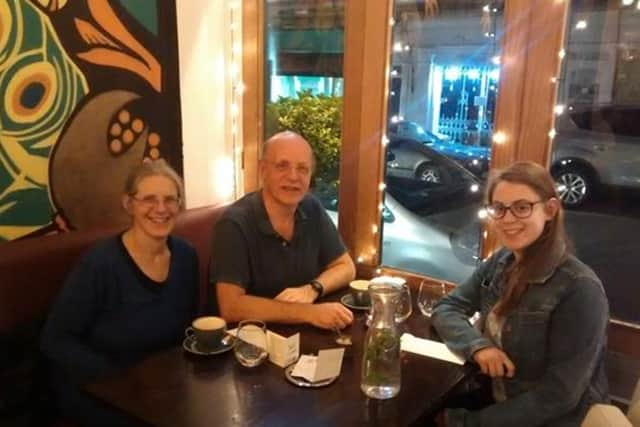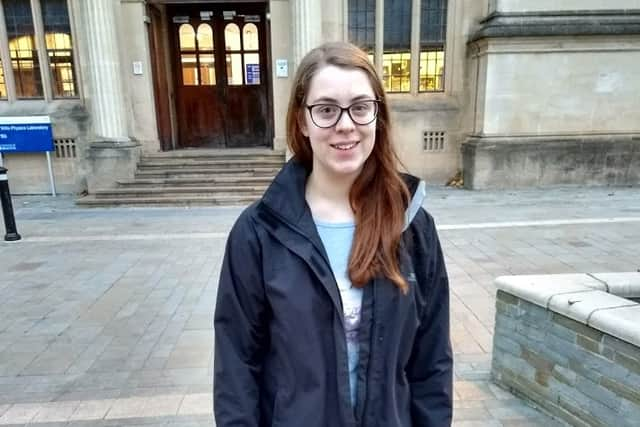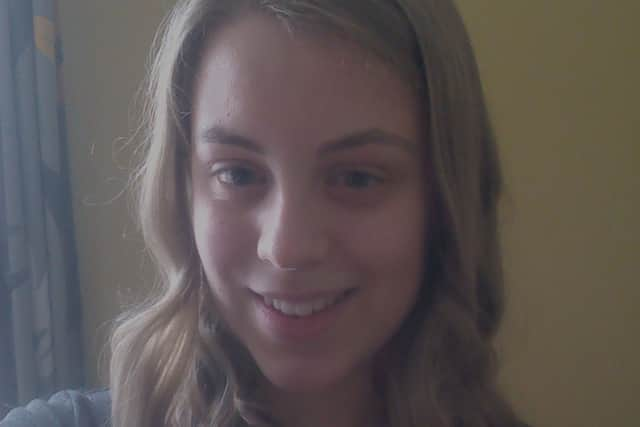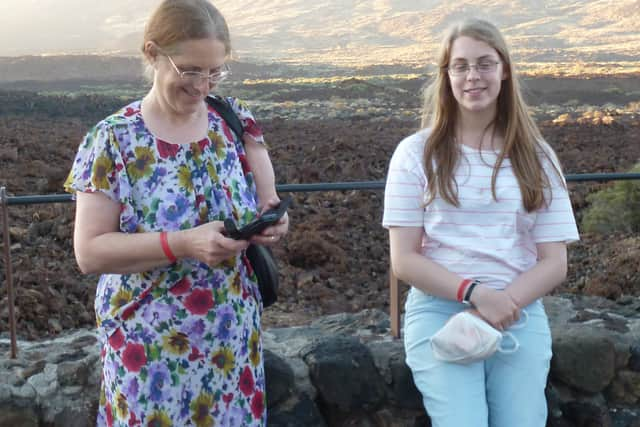Natasha Abrahart: Interview with parents demanding change after ruling on student daughter’s suicide
and live on Freeview channel 276
The parents of a university student who tragically took her own life have demanded increased protection for other vulnerable young people in higher education.
Natasha Abrahart was found dead in her flat in 2018, the day she was due to give a presentation to fellow students from the University of Bristol.


Advertisement
Hide AdAdvertisement
Hide AdRobert and Margaret Abrahart spoke to BristolWorld about their four-year fight for an overhaul of university processes and their call on the government to define ‘duty of care’.
‘She only had one standard and that was her best’
Natasha Abrahart is more than a statistic - not so long ago, she was a a gifted young woman with a bright future blazing ahead of her.
She had a knack for computer programming and was a natural problem solver. In her spare time, she loved playing the piano, baking and rock climbing.
Advertisement
Hide AdAdvertisement
Hide AdBut most of all she adored physics and had big dreams of becoming a researcher.
When she visited home in Nottingham, she would tell her parents about all the exciting things she’d picked up during her lectures.


“The fact that there is a shortage of physicists makes Natasha’s death all the more sad,” said Robert, himself a retired university lecturer.
“She was just the kind of person the university, and the world, needed.”
Advertisement
Hide AdAdvertisement
Hide Ad“Natasha only had one standard,” said retired psychological wellbeing practitioner Margaret. “And that standard was her best.”
Despite her academic talents, Natasha struggled by the time the second year of her course rolled around.
She was already facing daily battles with her social anxiety disorder, which rocketed when she was required to give interviews after conducting laboratory experiments.
On April 30, the day Natasha was expected to give a presentation to her fellow students, she took her own life.
Advertisement
Hide AdAdvertisement
Hide AdHer tragic death led to a landmark civil trial at Bristol County Court in which Judge Alex Ralton ruled that discrimination by the University of Bristol over Natasha’s disability led to her suicide.
The University, which denied that it had any duty of care to Natasha, was ordered to pay Margaret and Rob a total of £50,000 in damages.
‘It’s not over yet’
But court is a ‘difficult and expensive’ businesses, and despite the fact that Margaret and Rob have the outcome they wanted, it won’t bring their daughter back nor has it brought about any relief.
That will only happen ‘when things change’, they told us.
The pair admit they felt ‘traumatised’ as they later waved their son, Natasha’s younger brother, off on his own university journey.
Advertisement
Hide AdAdvertisement
Hide Ad“But in the end it was probably a good thing,” added Margaret, “as we have become completely obsessed with fixing this and he needed the space, I imagine.”
After spending hours trawling through thousands of documents over the past four years, the Abraharts joke they probably know more about university processes relating to mental health than the institutions do themselves.
But their examinsations have ‘opened up a can of worms’, revealing grey areas that are ‘a huge cause of concern’ and could even lead to further loss of life, they argue.
“The main thing is ‘duty of care’,” said Robert. “That is something that we’re going to urge the government to look at very carefully, because nobody seems to know what it actually means.”


Advertisement
Hide AdAdvertisement
Hide AdIt’s tricky to define the duty of care universities owe to their students, although they must take ‘reasonable steps’ to protect them from foreseeable physical and mental harm.
During the civil court case it was argued on behalf of Natasha’s estate that the University of Bristol owed a duty of care to Natasha, which had breen breached, but the court found that no such duty of care was owed.
“We send our kids to universities who say they offer pastoral support, but without duty of care, that’s just pot luck,” said Margaret.
The Abraharts also argue that some universities fail to share information not just internally, but amongst themselves following the death of a student, nor do they ‘properly investigate’ such deaths.
Advertisement
Hide AdAdvertisement
Hide Ad“There are so many missed opportunities for learning that it beggar’s belief,” said Robert.
“There needs to be a national framework. People go on about funding. But someone, somewhere, needs to take charge and work out what’s going on.”
‘Universities need to be held accountable’
The Abraharts reject the notion that 19 suicides between two universities in four years is ‘relatively low’, and that the focus should be on young people as a whole, rather than just students, when it comes to suicide.
“If it was your child, you wouldn’t think it was a low number,” said Robert.
Advertisement
Hide AdAdvertisement
Hide Ad“And students are not representative of the population at large. They are a subset of the population with their own special set of statistics.
“I would even argue that physicists are their own subset. Universities aren’t untouchable. They need to be held accountable.”


The Abraharts say they will ‘keep going’ until they are satisfied that, when it comes to dealing with the mental health of students, university processes are analysed and regulated.
This is something they are particularly keen to see in the wake of the pandemic, which has led to oversubscription and reduced human contact within universities.
Advertisement
Hide AdAdvertisement
Hide AdThey say they have received countless letters not only from bereaved families, but also families with a child that suffers from social anxiety disorder, telling them that they have ‘instilled hope’.
“It’s heartbreaking, and also humbling,” said Robert. “We can only continue to try and push through the barriers that the system throws at us.”
University of Bristol statement
A spokesperson for the University of Bristol said: “As with all universities, we provide our students with both academic and wellbeing pastoral support for their academic studies. We did not suggest otherwise in the recent court case.
“The University’s submissions in the case followed complex matters of fact and law in relation to whether a duty of care arose in a very specific set of circumstances; the judge found it did not and therefore the University was not negligent.
Advertisement
Hide AdAdvertisement
Hide Ad“In Natasha’s case, staff in the School of Physics were instrumental in helping Natasha to access appropriate professional support from the NHS.
“We have reviewed everything we do and in 2018 introduced a whole-institution approach to mental health and wellbeing, with substantially strengthened support for our students in their accommodation, in academic schools and through central support services.
“This has enabled us to provide more proactive support for student wellbeing, both for our students during their transition into University and to help create a sense of community and wellbeing during their time with us.
“Our enhanced teams are also able to provide direct support for students whenever they need it, 24/7, throughout the year.


Advertisement
Hide AdAdvertisement
Hide Ad“Alongside the support available, we have introduced an opt-in policy to alert a nominated contact when we have serious concerns about a student’s wellbeing and more robust procedures to assess students’ fitness to study.
“However, it is important that students receive appropriate specialist care under the NHS should they need it.
“We are fully committed to working with our partners in the NHS, charities and across the higher education sector in a collaborative effort to ensure we are collectively providing the best possible support for students in their studies.
“We continue to extend our deepest sympathies to Natasha’s family and friends. Everyone at the University is deeply affected by the death of any student and we are committed to doing all that we can to keep our students safe.”
Anyone can call the Samaritans for free on 116 123, email [email protected] or visit http://samaritans.org.
Comment Guidelines
National World encourages reader discussion on our stories. User feedback, insights and back-and-forth exchanges add a rich layer of context to reporting. Please review our Community Guidelines before commenting.
